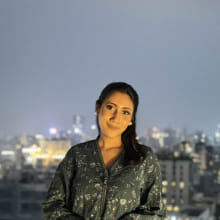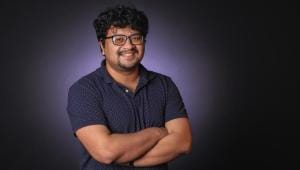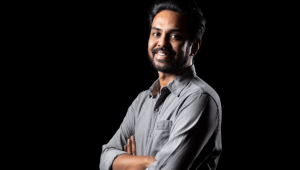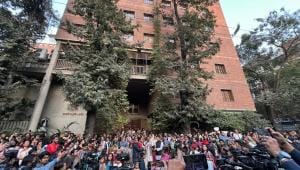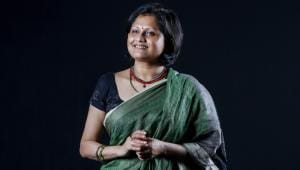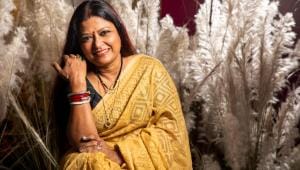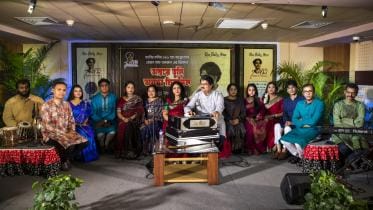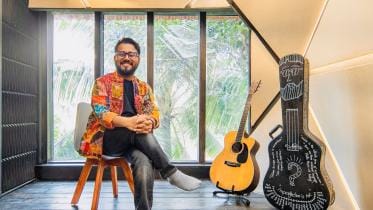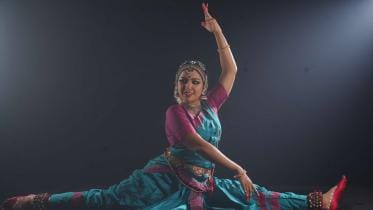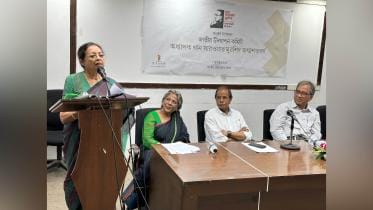Pocket full of dreams for Pranto
“My father was a theatre actor, but he never had the opportunity to pursue acting and became a journalist instead,” shares Pranto. “I believe that his unfulfilled dream was passed down to me, and I was meant to carry it forward.” In recent years, few rising actors have been more determined to prove their range than Abid Bin Parvez Pranto. From TVCs to short films and eventually fiction, he has steadily marked himself as an actor intent on versatility.
22 August 2025, 18:00 PM
Bangladesh’s Manoshi clinches Mrs Universe Canada runner-up title
“I wasn’t there to prove anything,” Manoshi Sarkar told The Daily Star. “I was there to reclaim the woman I’d put on hold.”
29 July 2025, 04:24 AM
Digital stars who transcended the ‘influencer’ tag
In a digital world that churns out creators by the minute, the label “content creator” has become both a badge of entry and a box. But for Rakin Absar, Kaarina Kaisar, Ridy Sheikh, and Nazia Hassan, that box was never going to be big enough.
Instead of riding the algorithm wave into redundancy, they each pivoted; deliberately or instinctively, who outgrew the “content creator” label and built new identities entirely. Podcast host. Actor. Choreographer. Wellness educator.
5 June 2025, 04:00 AM
‘Ontorey Tumi Acho Chirodin’: A tribute to Nazrul’s enduring musical legacy
To commemorate the 126th birth anniversary of Kazi Nazrul Islam, the National Poet of Bangladesh, the cultural platform Gems of Nazrul hosted a musical tribute titled “Ontorey Tumi Acho Chirodin” this evening. The event brought together prominent Nazrul exponents and emerging voices to celebrate the poet’s diverse musical repertoire and reflect on his unparalleled contributions to Bengali music.
31 May 2025, 16:27 PM
Jahid Nirob finds melody in ‘Silence’, starts own music academy
As someone who never attended a formal music school but was instead homeschooled in melodies by his father, Jahid Nirob tread his own path into the world of music. He started out playing guitar at homely ceremonies, never imagining that one day he would step into the role of a music director.
19 March 2025, 11:28 AM
Documenting our legendary artists: Anonna Ruma’s earnest initiative
How does a nation remember its artists? “What Novera is doing now will take us a long time to understand,” said legendary artist Zainul Abedin, decades ago. On Thursday (February 27) evening, as audiences watched the stories of Novera Ahmed and Monirul Islam unfold on the screen at Alliance Française de Dhaka, the weight of those words became clear.
1 March 2025, 14:58 PM
Decentralising filmmaking: Monsoon Revolution Film Production Workshop hosts Dhaka event
The Monsoon Revolution Film Production Workshop has officially been launched under the initiative of the Ministry of Cultural Affairs, with the vision of decentralising the filmmaking industry and nurturing new talent from across the country. The workshop aims to create opportunities for aspiring filmmakers beyond Dhaka, empowering them with hands-on training in storytelling, cinematography, production, editing, and the application of technology in filmmaking.
15 February 2025, 11:42 AM
Rangpur’s Moni dreams of preserving traditional dance
In the ever-evolving Bangladeshi dance scene, Motmainna Moni craves to leave a mark with her grace and poise. The young dancer age-old practices of Bangladeshi dance with a contemporary edge.
3 February 2025, 08:40 AM
Architects of the digital space
These influencers have shown us that entertainment can be meaningful, that education can be fun, and that every upload has the power to inspire.
29 December 2024, 18:00 PM
A day at Wangala festival with the Garo community
The grounds of Lalmatia Housing Society School and College came alive with the beats of drums and the colourful celebration of Wangala, the foremost festival of the Garo community. Known as the “Hundred Drums Festival,” Wangala is a time for the community to thank Misi Saljong, the Sun Deity, for a successful harvest. This festive celebration marks the end of the farming season and celebrates the blessings of nature.
7 December 2024, 04:14 AM
‘Was It Worth It?’: A First-Time Concertgoer’s Review of Atif Aslam’s Show
For someone like me who has never been to a concert before in her entire life, attending Atif Aslam's concert felt like a feast for the senses. When a friend of mine asked without a trace of forewarning, "Will you go to Atif Aslam's concert? I'm buying the tickets because they will sell out soon," and without hesitation, I replied, "Count me in for a ticket as well," as I couldn't let my once-in-a-lifetime opportunity to witness childhood nostalgia slip away like that.
30 November 2024, 08:08 AM
When musicians play the tune of defiance
Miles frontman Hamin Ahmed, who recently lost his brother Shafin Ahmed, was also present during the event. He said, “Do not fire a single bullet more. We want the government to listen to the demand of the students.”
3 August 2024, 12:20 PM
An aesthete: Celebrating the birth centenary of Khan Sarwar Murshid
To commemorate the 100th birth anniversary of the esteemed educationist, diplomat, and intellectual, the late Professor Khan Sarwar Murshid, a press conference was held today at the National Press Club.
1 July 2024, 13:17 PM



